2021年上外版必修三-04 现在分词做宾语补足语和状语【学生版】
必修4 Unit3 Grammar 现在分词作定语和宾补

A 5.They knew her well. They had seen her ___ up from childhood. A. grow B. grew C. was growing D. to grow B 6. We will make it ___to all ___ she is a new teacher. A.knowing, that C. known, who B. known, that D. knowing,
应用现在分词作宾语补足语,要掌握好三个“区别” 注:应用现在分词作宾语补足语,要掌握好三个“区别”
1 现在分词主动式作宾补和不定式主动式作宾补 现在分词主动式作宾补表示一个正在进行的主动动 作,不定式主动式作宾补表示动作的全过程或即将发生 的动作。试比较: 1)I heard him playing the piano in the next room. 2)Now let me hear you play the piano a second time.
• • • •
请你判断下列-ing形式 请你判断下列-ing形式 在句中所充当的成分 1. In many countries, shaking one’s head means “no” while nodding means “yes”. 主语 2. We can learn a lot about what a person is 介宾 thinking by watching his or her body language. 3. A good way of saying “I am full” is rubbing the 表语 stomach after a meal. 4. An old man walked into the waiting room with a walking stick in his hand. 定语
2021年上外版必修三-01 特殊句式:省略讲解及提升练习【学生版】

特殊句式:省略讲解及提升练习一、省略1.状语从句的省略当时间、条件、让步、方式等状语从句的主语和主句的主语一致或从句的主语是it且从句中含be动词时,可以省略状语从句中的主语和be动词,构成下列结构:连词+形容词/介词短语/现在分词/过去分词/不定式。
Metals expand when heated and contract when cooled.金属加热时就膨胀,冷却时就收缩。
2.不定式的省略(1)在一定的上下文中,为了避免重复,可以省去不定式中和前面句子中相同的动词(短语),只保留不定式符号to。
常用在expect,hope,intend,mean,try,want,wish等词后。
Firstly,people may feel forced when asked to do things that they don't want to.首先,当人们被要求去做他们不想做的事情时他们会感到是被迫的。
(2)but用作介词,意为“除……之外”时,前面有实义动词do,后接不定式时,要省略to;但前面没有实义动词do时,后接的不定式不省略to。
If he takes on this work,he will have no choice but to meet an even greater challenge.如果他接受了这份工作,除了迎接更大的挑战之外他别无选择。
3.特殊的省略结构:if省略结构if so如果这样的话if not如果不是这样的话if ever如果曾经有的话if necessary如果有必要的话if possible如果可能的话if any如果有的话巩固提升一、单项选择1.No matter how frequently ________, the works of Beethoven always attract a large number of people.A.performing B.performed C.to be performed D.being performed 2.Most green vegetables, ________ for too long, will lose nutrition.A.if to be cooked B.if cooked C.if cooking D.if being cooked 3.When challenges and setbacks, he remains , brave and firm.A.faced with… hesitant B.facing… resoluteC.in face of… indecisive D.facing with… determined4._________that she was accepted by the international company, Jane jumped with joy. A.Being told the news B.When the news to be toldC.As the news being told D.When told the news5.There were other reasons in addition to the bad weather why they didn't leave for Beijing___________.A.scheduled B.as scheduledC.as it scheduled D.as scheduling6.______ money, his parents managed to send him to university.A.Lacked B.Lacking of C.Though lacking D.Lacked in 7.Mimosa, 15 cm in height, is a sensitive small plant, which will close when ______. A.touching B.touched C.is touched D.to be touched 8.Nurseries are the areas where plants are grown to be sold or ______ in other places. A.being planted B.to plant C.plant D.planted9.The text and dialogues below focus on cultural differences between Chinese and Western societies which can create misunderstanding if ______.A.ignore B.to be ignored C.ignoring D.ignored 10.Contrast may make something appear more beautiful than it is when ________ alone. A.seen B.to be seenC.being seen D.having been seen11.Unless to speak, you should remain silent at the conference.A.invited B.invitingC.being invited D.having invited12.He often sat in a small bar drinking considerably more than ________.A.was good for his health B.his health was goodC.his good health D.was in good health13.________ with the size of the whole earth,the biggest ocean does not seem big at all. A.Compare B.When comparingC.Comparing D.When compared14.Though ________ of the danger, Mr. Brown still risked his life to save the boy in the fire. A.having told B.being toldC.to be told D.told15.Though of the danger, Mr. Brown still risked his life to save the boy in the fire. A.having told B.tellingC.to be told D.told16.This problem may lead to more serious ones if ________ unsolved.A.making B.remained C.keep D.left17.If ________ in the elevator, please press the emergency button immediately.A.trapped B.trappingC.having trapped D.to be trapped18.Although _____ by the opposite team, the players were not discouraged but practiced harder. A.beating B.beatenC.having beaten D.being beaten19.If ___for the job, you’ll be informed soon.A.to accept B.acceptC.accepting D.accepted20.When _____ about one of the biggest concerns today, many citizens mentioned the sharp rise in housing price.A.asking B.to askC.asked D.having asked 21.Misunderstandings ________ from lack of social communication, unless ________ properly, may lead to serious problems.A.arisen; handling B.arising; handledC.rising; handled D.risen; handling22.There are some health problems that, when ____in time, can become bigger ones later on. A.not treated B.not being treatedC.not to be treated D.not having been treated23.While ________ the meal, some talented students gave a wonderful folk dance performance, ________ the elderly very happy.A.enjoyed, making B.enjoying, making C.to enjoy, making D.enjoying, to make 24.If _____ in wet sand, the vegetables can remain fresh for a long time.A.being buried B.having buried C.buried D.burying 25.When first ______ to the market, these products enjoyed great success.A.introducing B.introducedC.introduce D.being introduced26.Daniel has undertaken to keep the secret, so he won’t tell anyone even though ______. A.asked to keep B.to be asked C.to ask D.asked to27.The climate here is quite pleasant, the temperature rarely, ________, reaching 30℃ in summer.A.if not B.if ever C.if any D.if so28.If not ________with the respect he wants, the singer gets very ill-tempered and complains all the time.A.treated B.being treatedC.treating D.having been treated29.—When is he willing to lend somebody some money?—Only when hard enough.A.to press B.pressing C.pressed D.presses 30.Some institutions have established reading clubs to promote reading, but the effort, though________, is far from enough.A.appreciated B.appreciating C.having appreciated D.to appreciate二、汉译英1.在设计广告标语的过程中,广告公司没有墨守成规,而是将潜在顾客的需求考虑在内.(account)2.他在整理书籍时发现了一本旧日记。
必修四unit3和unit4grammar之现在分词做表语-定语-宾补和状语剖析.
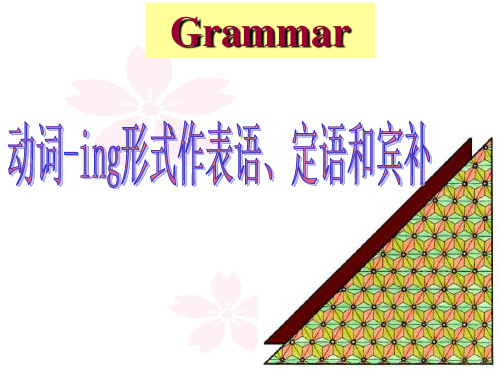
learned 4.Lessons _________(learn) in sports can help us in our dealing with other people.
分析:主干(主谓):Lessons can help us in our dealing with other people. 因句中已有谓语动词can help,可见learn 为非谓语动词, 与lessons 是被动关系,所以用-ed形式learned。
1. I saw Bob beating the boy. (我看见Bob正在打这个男孩)
ing 着重动作的过程,正在进行或反复的动作
. 2. I saw Bob beat the boy.
(我看见Bob打这个男孩)
(to )do强调动作的结果,完成或一次性动作
3. I saw the boy beaten by Bob. (我看见这个男孩被Bob打)
用作状语的动词-ing 形式, 此时可叫做“现在分词”。
即:V-ing短语在句子中作 状语,可以表示时间,原
因,结果,条件,让步,
方式或伴随动作等。
1). Hearing the news, they immediately set off for Shanghai.
时间
When they heard the news,
思考:划线的单词在句子中所作什么成分呢? 1. The story is interesting.
表语
表语:放在系动词后面
2. The running man is Wangbaoqiang. 定语
定语:…的,+名词 / 名词+短语
3.We can see a boy singing in the picture.
必修四 Unit 3 Grammar 现在分词作表语,定语,宾语补足语

5.(2012江西) John has really got the job because he showed me the official letter ________ him it. A. offered C.to offer B.offering D.to be offered
6.(2012辽宁)The old couple often take a walk after supper in the park with their pet dog them.
The man standing there is Peter’s father. = The man who is standing there is Peter’s father.
b. 表示经常性的动作或某种状态 (变为从句时 用一般时态)
They lived in a room facing the south.
We saw him cross the road..
我们看见他正在过马路.
We saw him crossing the road..
从A、B、C、D四个选项中,选出可以 填入空白处的最佳选项。 1. The next thing he saw was smoke _____ from behind the house. (2011新 课标全国卷) A. rose B. rising C. to rise D. risen
Look at the examples below, paying attention to the underlined parts. Here the –ing form is used as the object complement, predicative, attribute.
2024上外版新教材高中英语必修三全册单词表(精校打印版)全文

Medicine
sn/
Ge Hong
葛洪(东晋医药学家)
East Jin
/'ɪ:st 'dʒɪn/
东晋(中国朝代名)
Africa
/'æfrɪkə/
非洲
Asia
/'eɪʃə/
亚洲
Unit 2 Art and Artists
A
carpenter
/'kɑːpəntə/
n. 木工;木匠△
talent
/'tælənt/
使开始明白;使渐渐领悟;使开始理解
重新开始
被诊断出
经历(灾难或其他困境)而幸存
/'rɪ:d 'kɒlɪdʒ/
里德学院(美国)
/'mækɪntɒʃ/
麦金塔电脑(苹果公司生产的一种个人电脑)
/wɒz/
沃兹(Wozniak 的昵称,人名)
/'æpl/
苹果电脑公司
/nekst/
NeXT 电脑公司
/'həʊl 'ɜːθ'kætəlɒg/ 《全球目录》(杂志名)
B
banquet
/'bæŋkwɪt/
n. 宴会;盛宴△
extend
/ɪk'stend/
v. 提供;给予
greeting
/'grɪ:tɪŋ/
n. 问候;招呼;迎接;致意
distinguished /dɪ'stɪŋgwɪʃt/
adj. 卓越的;杰出的;著名的
attendance
/ə'tendəns/
n. 出席;参加;上学;到场△
n. (常用于名称)公司;商号;商行
Unit 2语法 现在分词作状语和宾语补足语 课件2021-2022学年高中英语人教版必修第三册

2. Being tired, I stopped to have a rest. 原因状语 3. The snow lasted a week, resulting in serious traffic
confusion in the whole area.
结果状语
4. Complete the following sentences using suitable verbs from
adve P16-17
4. At age 18, instead of following the traditional path
of marriage like the majority ofgirls, she chose to study medicine.
the text.
方式状语
5. She stood there, listening to the wind and watching the rain.
伴随状语
Activity 2: 分词作状语小结
1. 动词-ing形式作状语时可以表示原因、时间、结果、方式、伴随 情况或者让步、条件,作方式状语和伴随状语时可以变为并列成分, 作原因、条件、让步、时间状语时相当于对应的状语从句。
1 ---her brother complained , thinking of the high
tuition fees.
adverbial 状语
一想到高额的学费,她的哥哥不禁抱怨起来。 He brother complained when he thought of the high tuition fees.
Lead-in Read the sentences below and discuss the function and
新人教版高中英语必修三U2语法 现在分词(短语)作状语、宾补
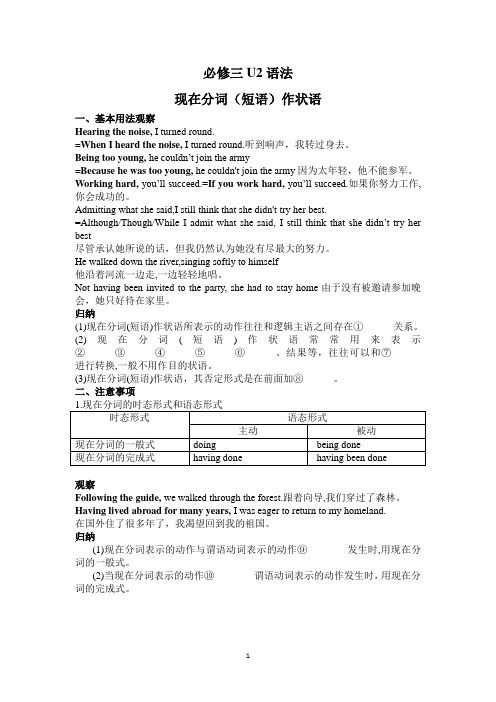
必修三U2语法现在分词(短语)作状语一、基本用法观察Hearing the noise, I turned round.=When I heard the noise, I turned round.听到响声,我转过身去。
Being too young, he couldn’t join the army=Because he was too young, he couldn't join the army因为太年轻,他不能参军。
Working hard,you’ll succeed.=If you work hard, you’ll succeed.如果你努力工作,你会成功的。
Admitting what she said,I still think that she didn't try her best.=Although/Though/While I admit what she said, I still think that she didn’t try her best尽管承认她所说的话,但我仍然认为她没有尽最大的努力。
He walked down the river,singing softly to himself他沿着河流一边走,一边轻轻地唱。
Not having been invited to the party, she had to stay home由于没有被邀请参加晚会,她只好待在家里。
归纳(1)现在分词(短语)作状语所表示的动作往往和逻辑主语之间存在①______关系。
(2)现在分词(短语)作状语常常用来表示②______③______④______⑤______⑥______、结果等,往往可以和⑦______进行转换,一般不用作目的状语。
(3)现在分词(短语)作状语,其否定形式是在前面加⑧______。
二、注意事项观察Following the guide, we walked through the forest.跟着向导,我们穿过了森林。
高中英语上外版选择性必修第三册Unit4ProtectingtheEnvironmentDiggin
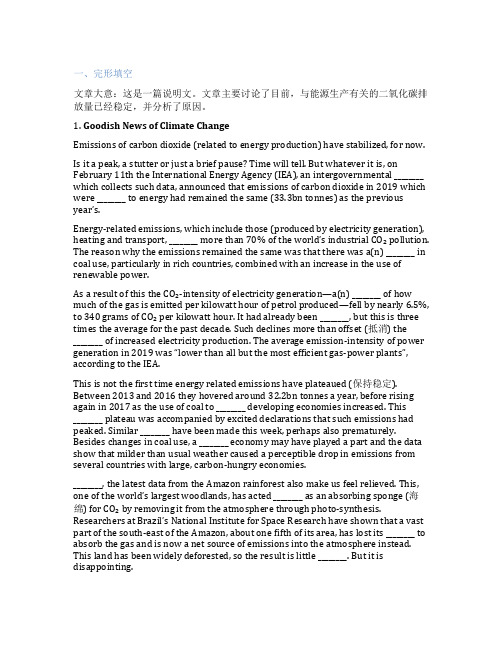
一、完形填空文章大意:这是一篇说明文。
文章主要讨论了目前,与能源生产有关的二氧化碳排放量已经稳定,并分析了原因。
1. Goodish News of Climate ChangeEmissions of carbon dioxide (related to energy production) have stabilized, for now. Is it a peak, a stutter or just a brief pause? Time will tell. But whatever it is, on February 11th the International Energy Agency (IEA), an intergovernmental ________ which collects such data, announced that emissions of carbon dioxide in 2019 which were ________ to energy had remained the same (33.3bn tonnes) as the previous year’s.Energy-related emissions, which include those (produced by electricity generation), heating and transport, ________ more than 70% of the world’s industrial CO₂ pollution. The reason why the emissions remained the same was that there was a(n) ________ in coal use, particularly in rich countries, combined with an increase in the use of renewable power.As a result of this the CO₂-intensity of electricity generation—a(n) ________ of how much of the gas is emitted per kilowatt hour of petrol produced—fell by nearly 6.5%, to 340 grams of CO₂ per kilowatt hour. It had already been ________, but this is three times the average for the past decade. Such declines more than offset (抵消) the________ of increased electricity production. The average emission-intensity of power generation in 2019 was “lower than all but the most efficient gas-power plants”, according to the IEA.This is not the first time energy related emissions have plateaued (保持稳定). Between 2013 and 2016 they hovered around 32.2bn tonnes a year, before rising again in 2017 as the use of coal to ________ developing economies increased. This________ plateau was accompanied by excited declarations that such emissions had peaked. Similar ________ have been made this week, perhaps also prematurely. Besides changes in coal use, a ________ economy may have played a part and the data show that milder than usual weather caused a perceptible drop in emissions from several countries with large, carbon-hungry economies.________, the latest data from the Amazon rainforest also make us feel relieved. This, one of the world’s largest woodlands, has acted ________ as an absorbing sponge (海绵) for CO₂ by removing it from the atmosphere throu gh photo-synthesis. Researchers at Brazil’s National Institute for Space Research have shown that a vast part of the south-east of the Amazon, about one fifth of its area, has lost its ________ to absorb the gas and is now a net source of emissions into the atmosphere instead. This land has been widely deforested, so the result is little ________. But it is disappointing.1.A.circumstance B.environment C.contribution D.organization 2.A.available B.similar C.related D.referred3.A.call for B.account for C.stand for D.allow for4.A.decline B.increase C.promotion D.recovery5.A.product B.idea C.measure D.result6.A.floating B.falling C.disappearing D.remaining7.A.outcome B.change C.effect D.achievement8.A.fuel B.regulate C.handle D.expand9.A.frequent B.previous C.natural D.disastrous10.A.tips B.plans C.warnings D.comments11.A.booming B.dynamic C.strong D.depressed12.A.In addition B.By contrast C.In consequence D.In fact13.A.accidentally B.absolutely C.historically D.correctly14.A.prospect B.ability C.need D.decision15.A.anger B.hope C.devotion D.surprise二、阅读选择(阅读理解)文章大意:这是一篇说明文。
高中英语上外版必修第三册Unit4LifeandTechnologyDiggingin课后练习、课时

一、根据首字母填写单词(单词拼写)1. I should have c________ my cellphone last night. Now the battery is running out.(根据首字母单词拼写)二、根据汉语意思填写单词(单词拼写)2. You must have ________(误解) my meaning; I didn’t mean that. (根据汉语提示单词拼写)3. Some people________ (可能)have complained about income inequality because they were starving then. (根据汉语提示单词拼写)4. In the past, students and their parents________(肯定) have complained about the limitless amount of homework. (根据汉语提示单词拼写)三、根据中英文提示填写单词(单词拼写)5. The poor weather may have a________ (是……的原因)for the small crowd. (根据中英文提示填空)四、完成句子6. 火山岩忽明忽暗,讲述着过去火山几度喷发的故事,这本来可以警告这座城里的人,灾难即将到来!Its ashy rocks,now dark,now light,told a story of past eruptions that ________ ________ ________ the city what was to come!7. The children_________ _________ _________very excited as they opened the envelope.孩子们打开信时一定很兴奋。
五、根据所给汉语提示填空8. “You_______ ________ ________five minutes earlier (本该早五分钟来), John. We have begun our class.” said the teacher. (根据汉语提示完成句子)9. You_______________(一定有过一些时刻) when you were disappointed. (“must have done sth ”意为“一定做过某事”)10. —He hasn’t finished the work yet.—Well, he ____________ (本该完成). (根据汉语提示完成句子)六、句型转换11. “What?!” I tried to turn on my brain but the engine just wouldn’t start.(Plea se describe the situation when you couldn’t find your key in front of the door.) (按要求仿写)____________________________________________________________________12. They should have completed the project earlier this month. (同义句转换)The project ________ ________ ________ ________ earlier this month.七、汉译英(整句)(翻译)13. 你本可以邀请他参加你的婚礼的。
2021年上外版必修三-05 状语从句的省略 【学生版】
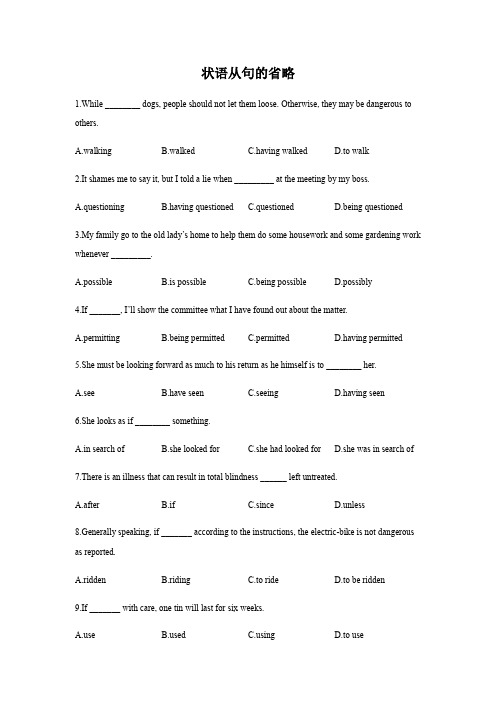
状语从句的省略1.While ________ dogs, people should not let them loose. Otherwise, they may be dangerous to others.A.walkingB.walkedC.having walkedD.to walk2.It shames me to say it, but I told a lie when _________ at the meeting by my boss.A.questioningB.having questionedC.questionedD.being questioned3.My family go to the old lady’s home to help them do some housework and some gardening work whenever _________.A.possibleB.is possibleC.being possibleD.possibly4.If _______, I’ll show the committee what I have found out about the matter.A.permittingB.being permittedC.permittedD.having permitted5.She must be looking forward as much to his return as he himself is to ________ her.A.seeB.have seenC.seeingD.having seen6.She looks as if ________ something.A.in search ofB.she looked forC.she had looked forD.she was in search of7.There is an illness that can result in total blindness ______ left untreated.A.afterB.ifC.sinceD.unless8.Generally speaking, if _______ according to the instructions, the electric-bike is not dangerous as reported.A.riddenB.ridingC.to rideD.to be ridden9.If _______ with care, one tin will last for six weeks.eedingD.to use10.Look around when ________ the street.A.acrossB.crossingC.crossedD.to be crossing11.When ________ a test, one may feel shaky, sweaty, with his heart beating quickly.A.havingB.haveC.hadD.having had12. Misunderstandings ________ from lack of social communication, unless ________ properly, may lead to serious problems.A.arisen; handlingB.arising; handledC.rising; handledD.risen; handling13.As is often the case, he tends to forget all about eating and sleeping, especially when deeply ________ in work.A.absorbingB.being absorbedC.to absorbD.absorbed14.Misunderstandings________ from lack of communication,unless________ properly,may lead to serious problems.A.arisen; dealt withB.arising; dealt withC.rising; dealing withD.risen; dealing with15.The climate here is quite pleasant, the temperature rarely, ____, reaching 30℃ in summer.A.if notB.if anyC.if soD.if ever16.Generally speaking, when _____ according to the directions, the medicine has no side effect.A.takenB.takingC.to takeD.to be taken17.Though_________to see us, the professor gave us a warm welcome.A.surprisingB.was surprisedC.surprisedD.being surprised18.There are some health problems that, when ____in time, can become bigger ones later on.A.not treatedB.not being treatedC.not to be treatedD.not having been treated19.When ________ to someone,I usually say,“Pleased to meet you.”A.introduceB.introducedC.introducingD.am introduced20.While ____my homework, I heard a cry for help.A.doB.didC.doingD.having done21.A beam of light will not bend(弯曲)round corners unless____ to do so with the help of a reflecting device(反射装置)。
高中英语上外版选择性必修第三册Unit4DisasterSurvival选择性必修第三册课后练习、课
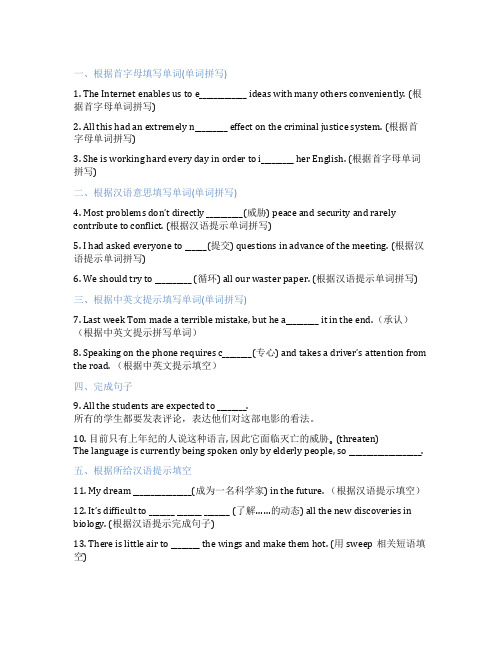
一、根据首字母填写单词(单词拼写)1. The Internet enables us to e_____________ ideas with many others conveniently. (根据首字母单词拼写)2. All this had an extremely n_________ effect on the criminal justice system. (根据首字母单词拼写)3. She is working hard every day in order to i_________ her English. (根据首字母单词拼写)二、根据汉语意思填写单词(单词拼写)4. Most problems don’t directly __________(威胁) peace and security and rarely contribute to conflict. (根据汉语提示单词拼写)5. I had asked everyone to ______(提交) questions in advance of the meeting. (根据汉语提示单词拼写)6. We should try to __________ (循环) all our waster paper. (根据汉语提示单词拼写)三、根据中英文提示填写单词(单词拼写)7. Last week Tom made a terrible mistake, but he a_________ it in the end.(承认)(根据中英文提示拼写单词)8. Speaking on the phone requires c________(专心) and takes a driver’s attention from the road. (根据中英文提示填空)四、完成句子9. All the students are expected to ________.所有的学生都要发表评论,表达他们对这部电影的看法。
高中英语上外版选择性必修第三册Unit4ProtectingtheEnvironmentReadin

一、根据首字母填写单词(单词拼写)1. It seems strange that we are just spending a lot on mooncakes for their delicate p________ rather than their flavor. (根据首字母单词拼写)2. Japan has decided to pour the radioactive water into the Pacific ocean, t_________ the lives of numerous fishermen and the future of mankind. (根据首字母单词拼写)3. The army sent 150, 000 soldiers to Tangshan to dig out those who were t ______in ruins. (根据首字母单词拼写)二、根据汉语意思填写单词(单词拼写)4. Timmy had nothing to eat when he was ______(使落入险境)under the stones.(根据汉语提示完成句子)5. I was shocked when I saw on TV that so many people were ________ (围困) in the burning buildings. (根据中文提示单词拼写)6. After the earthquake, helicopters and a navy ship were sent to rescue those who were_________(受困于) in the ruins. (根据汉语提示单词拼写)三、根据中英文提示填写单词(单词拼写)7. When we were t______________ in the ruins, the soldiers came to their rescue. (陷入)(根据中英文提示单词拼写)8. She c__________(骑车)to school every day. (根据中英文提示拼写单词)四、完成句子9. 老师建议我们参加比赛,从中我们能获益良多。
期末复习-基础版(学生版)-讲义-上海市南洋模范中学上教版高中英语第三册

新高一必修三期末复习基础版学习目标:掌握本学期语法易错点非谓语。
引入:1. When he was a boy, he used to go there and watch _____.A. to repair bicyclesB. bicycles to be repairedC. bicycles being repairedD. repairing bicycles2. Have you considered _____ your job as a teacher?Yes. I like the job because a teacher is often considered _____ a gardener.A. to change; to beB. to change; beingC. changing; beingD. changing; to be3. The dog, _____, will be made a good watchdog.A. to train properlyB. being trained properlyC. properly to trainD. trained properly4. _____ the diamond, he had to look for a place to hide it.A. Having stolenB. Having been stolenC. StolenD. Stealing5. _____ the front door _____, he had to enter the room through the back door.A. Seen; paintedB. Seeing; paintedC. Being seen; being paintedD. Seeing; being painted6. And there, almost _____ in the big chair, sat her little brother, who never had to be told to keep quiet.A. having lostB. losingC. to be lostD. lost7. He looked around and caught a man _____ his hand into the pocket of a passenger.A. putB. to be puttingC. to putD. putting8. To answer correctly is more important than _____.A. that you finish quicklyB. finishing quicklyC. to finish quicklyD. finish quickly9. The old farmer, _____ the badly injured and burnt soldier, came out of the burning farmhouse, calling continuously for help.A. supportingB. having supportedC. being supported byD. being supported10. In January , 2004, the United States successfully launched “Spirit”, a Mars Exploration Rover, _____ a new milestone in the history of mankind.A. it markedB. markingC. markedD. to mark阅读下面两句话1)My father forgot to take an umbrella with him.2)My father forgot seeing the film before.这两句话意义有什么差别?你知道哪些动词搭配to do,哪些动词搭配doing,哪些都可以吗?思考一下填写一下:_______________________________________________________________________________ _______________________________________________________________________________ ______________________________课堂精讲:知识点一、非谓语【知识梳理】非谓语动词的三种形式(1)不定式一、不定式的作用1.作主语:不定式作主语时,谓语用单数。
现在分词现做状语与宾语补足语

必修三unit 2 语法学案----现在分词做状语与宾语补足语name___________ number___________一、动词-ing形式作状语动词-ing形式是非谓语动词的一种,兼有动词和形容词的特征,在句中可作表语,定语,宾语补足语和状语,一般表示进行或主动的意思。
动词-ing形式用作状语时,其逻辑主语必须与句子的主语一致,动词-ing形式所表示的动作和句子的主语是主动关系。
e.g.1. This result is very _______________(disappoint).2. Halloween is a festival _____________ (celebrate) on the night of 31st October.3. ___________ (look) out of the window, he saw a snake.1. 作时间状语e.g. Seeing the police, he made a run for the exit. 一看到警察,他就朝出口奔去。
分析:see的动作是由其逻辑主语“he”发出,与句子的主语he一致,且构成主动关系,所以用动词-ing形式。
将下面的时间状语从句改写成包含现在分词短语的简单句。
When he walked out of the room, he saw a dog.=____________________________________, he saw a dog.2. 作原因状语e.g. Being ill, he didn’t go to school yesterday. 因为生病了,他昨天没有上学。
分析: He is ill是He didn’t go to school的原因。
be的逻辑主语和句子主语是一致, 主动关系。
翻译句子:由于不认路,他迷路了。
As he didn’t know the way, he got lost.=Not ____________________________, he got lost.动词-ing形式的否定式是在其前面加not。
- 1、下载文档前请自行甄别文档内容的完整性,平台不提供额外的编辑、内容补充、找答案等附加服务。
- 2、"仅部分预览"的文档,不可在线预览部分如存在完整性等问题,可反馈申请退款(可完整预览的文档不适用该条件!)。
- 3、如文档侵犯您的权益,请联系客服反馈,我们会尽快为您处理(人工客服工作时间:9:00-18:30)。
现在分词做宾语补足语和状语1现在分词作宾语补足语现在分词作宾补,表示宾语与作宾补的动词之间是主动关系。
.(1)动词的宾语补足语①位于感官动词后:如catch(当场发现),see, hear, feel, smell, watch, find, listen to,look at,notice,observe等。
*She felt anger arising in her heart.她感到心中涌起股怒气。
*He observed a stranger hanging a round the store. 他看到一个陌生人在商店附近闲逛。
②位于使役动词后:如set, keep, have, get, leave 等。
*His question has set me thinking.他的问题使我深思。
*She kept me waiting for over twenty minutes.她让我等了20多分钟。
注意:现在分词作宾补,表示动作正在进行;动词原形作宾补,则表示动作的全过程。
试比较:*I saw him getting out of the car. 我看见他正下车。
*I saw him get out of the car. 我看见他下车了。
练习:I saw a girl __________( cry) in the street.I caught him ____________(read) my private letter.The joke set her_________(burst) out laughing.那个笑话使他大笑起来。
We shouldn't keep our lights___________(burn) in the day.2现在分词作状语(1)现在分词v-ing的形式一:一般式(doing) 与完成式(having done)①现在分词的一般式(doing)作状语,表示动作与谓语动词的动作同时发生;②现在分词的完成式(having done)作状语表示动作发生在谓语动作之前。
*Following in his father's footstep, he chose to study astronomy at university.他继承了父亲的衣钵,在大学里选择了天文学。
*Having lost all my old friends, I felt lonely and shy at my new school. 失去了我所有的老朋友,我在新学校感到孤独和害羞。
练习:________________(represent) the Student Association,I went to the airport to meet the international students.代表学生会,我去机场迎接国际学生。
____________________ (finish)his summary,he went out for a walk.完成总结后,他出去散步了。
(2)现在分词v-ing的形式二:主动式(doing/having done) 与被动式(being done/having been done)现在分词的主动式(doing/having done)作状语时,表示逻辑主语和其之间是主动关系;现在分词的被动式(being done/having been done)作状语时,表示逻辑主语和其之间是被动关系。
注意:现在分词的逻辑主语是句子的主语。
*We walked along the river bank, talking and laughing. 我们沿河岸有说有笑地走着。
(主动) *Being repaired now,the computer can't be used. 由于现在正在修理,这台电脑不能用了。
(被动)练习:_________________(struggle)for years, he finally won the champion.经过多年的奋斗,他终于赢得了冠军。
____________________(show) around the lab, we were led into a hall.参观完了实验室,我们被领进了大厅。
(3)现在分词作状语的功能现在分词作状语可以表示时间、原因、条件、让步、结果、方式、伴随等,相当于状语从句。
①时间状语表示时间,位于句子前半部分,可与when, while引导的时间状语从句相互转换;有时分词前加when或while以示强调。
*When(when可略) comparing different cultures, we often pay attention only to the differences. = When we are comparing different cultures, we often pay attention only to the differences. 在比较不同的文化时,我们往往只注意差异。
练习:____________(walk) down the street, I came across David.= When _________ down the street, I came across David. 沿街走时,我偶然遇到了戴维。
_________________(work) for two days, Steve managed to finish his report.= After _____________ for two days, Steve managed to finish his report.工作了两天,史蒂夫设法完成了他的报告。
②原因状语表示原因,位于句子前半部分,可与as, since, because引导的原因状语从句相互转换。
*Being ill, she didn't go to school as usual today.=Because she was ill, she didn't go to school as usual today.因为生病,她今天没像往常一样去上学。
练习:Not ____________(know) her address, I had better telephone her to come over.= __________________ her address, I had better telephone her to come over.由于不知道她的地址,我还是打电话让她过来为好。
________________(spend) nearly all his money,the employee couldn't afford to stay ata hotel. =_____________________ nearly all his money,the employee couldn't affordto stay at a hotel.那位雇员几乎已经花完了所有的钱,所以没钱住旅馆了。
③条件状语表示条件,位于句子前半部分,可与if, unless等引导的条件状语从句相互转换。
*Turning right, you will find the circus you want.=If you turn right, you will find the circus you want.向右转,你会找到你想找的马戏团。
练习:_________(go) straight down the road, you will find the canteen.= _____________ straight down the road, you will find the canteen.沿着这条路一直走,你就会找到食堂。
__________(work) hard, you will pass the exam. = __________hard, you will pass the exam.如果努力学习,你就会通过考试。
答案Going If you go Working If you work④让步状语作让步状语,相当于让步状语从句,有时现在分词(短语)前可带有连词although, even if, even though等。
*Though knowing all this, they made me pay for the damage.= Though they know all this, they made me pay for the damage. .尽管知道了这一切,他们还是让我赔偿损失。
练习:_____________(Know) all this, I still want to see it myself.=_________________ all this, I still want to see it myself.尽管知道一切情况,我还是想亲自看一看。
_______________ (try) many times, he still couldn't overcome the difficulties.=________________ many times, he still couldn't overcome the difficulties.尽管尝试了多次,他仍未能克服困难。
答案Knowing Although I know Having tried Though he had tried⑤结果状语现在分词作结果状语时表示必然的结果,通常放在句末。
有时为了突出结果,现在分词前可加thus,相当于so或so that引导的结果状语从句。
*The mother died, leaving a lot of money for her children.那位母亲去世了,给她的孩子们留下了一大笔钱。
*Fifteen million trees had been blown down by the high winds,blocking roads, paths and railway lines.1500万棵树被大风刮倒,堵塞了道路和铁路线练习:Mother drew the curtain for me, _____________(block) out the light.=Mother drew the curtain for me ______________ out the light. 妈妈为我拉住窗帘,挡住光线. Group activities were organized after class , _____________(build) up children's team spirit.课后组织一些小组活动,增强孩子们的团队精神.⑥方式或伴随状语动词-ing作方式或伴随状语时,谓语动词表示动作发生的方式、背景或情况。
